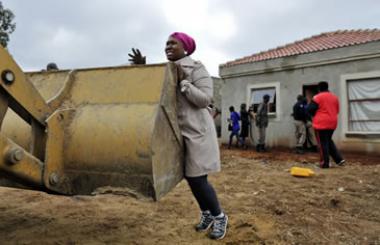Government appeals for co-operation in Lenasia housing demolition
 An unidentified woman unsuccessfully tries to stop a bulldozer from demolishing her home in Lenasia.
An unidentified woman unsuccessfully tries to stop a bulldozer from demolishing her home in Lenasia.
The Gauteng Department of Local Government and Housing has appealed for co-operation in its efforts to resolve the matter of the illegal sale of land in Lenasia South.
On Thursday 8th November, the housing department of the Gauteng province began demolishing homes that it said were constructed on illegally sold land, despite efforts by protesters to stop the demolitions.
Detailing the events that unfolded leading up to the demolition of the illegally built houses in Lenasia South, the Gauteng Provincial Government said in a statement on Monday that to date, 10 cases were investigated by the Hawks in the illegal sale of land -- seven suspects were arrested, five cases were currently on trial and two have been withdrawn pending further investigations.
"We are also pursuing three other cases. We call upon the community to co-operate with us in order to make more arrests," said the department in a statement.
Official demolitions of houses that have been illegally built in the area started last week Thursday and to date, the department has demolished 51 structures. The department said all 113 structures earmarked for demolition were currently not occupied by any household or family.
On Friday, 9 November 2012, the illegal occupants approached the Gauteng South High Court for an urgent court interdict to stop the department from continuing with the demolition process.
"The application was dismissed with costs. Therefore, the court order still stands," said the department.
The Gauteng Department of Local Government and Housing appointed audit firm George Fivaz to investigate irregularities in the provision of houses in the province. Fivaz tabled a report of findings to the department in 2002.
The report had various recommendations and all the affected pieces of land in Lenasia were part of the report. The department said it was now implementing the recommendations.
In February 2007, several developers were implicated for the illegal sale of land. The implicated included Richard Zikhali and his wife Hlengiwe Ximba, as well as Michael Madogola.
Ximba has since entered into a plea bargain with the State and was sentenced to six-year imprisonment, with a three-year suspended sentence. Zikhali and Madogola will be going on trial during the first week of December 2012.
Hilda Sikhute is out on bail and is attending trial; while Muziwamandla Poto, also known as Radebe by locals, and Elizabeth Masinya are out on bail.
"One of the primary suspects has been cited in all these illegal activities and a case of fraud was opened against Durban Baloyi, who is a former developer for the Department in December 2010. He was arrested and released on bail.
"The case was withdrawn in court to allow the Hawks to complete the investigations," said the statement.
Sifiso Handsome Ditau, an official from the City of Johannesburg, is out on bail and a disciplinary case is underway.
The department said investigations into the illegal sale of land in the Johannesburg South area, including Lenasia, Ennerdale and Lawley, were first conducted as far back as 2006.
"Illegal sale of land occurred and the department instituted an investigation. A forensic investigation was undertaken immediately to establish all the facts. The report was submitted to the Head of the Department for consideration and implementation in early 2010," it said, adding that consultation processes with all affected parties did occur.
The report findings
The department said the forensic report established that illegal sale of land indeed took place. Furthermore, it also found that:
- Different transactions and costs were paid for various pieces of land and stands;
- Documents were acquired illegally, including title deeds and deeds of sale that were concluded;
- Unknown people were in a process of developing departmental vacant stands which are situated amongst developed stands;
- Constructions which were stopped were continuing, despite interventions by the department;
- Municipal services were illegally connected;
- Where developments were taking place, the stands were being fenced;
- Further investigations by the department also revealed that stands were illegally sold or occupied and occupants were already constructing houses.
"In Lenasia, at the time, investigations revealed that 678 stands were illegally occupied. In Ennerdale and Lawley, an estimated number of 1 000 stands were affected," said the department.
This figure has been rising due to the continuation of illegal construction of houses, despite the department's actions to stop the process.
The department said it had exhausted all the court processes at its disposal.
In September 2010, there was an interim court order prohibiting the department from evicting and demolishing the illegal properties in Lenasia Ext 13 and Lenasia South Ext 4 and Ennerdale.
The applicants were also interdicted from further erecting and constructing structures on the properties belonging to the department until a final order was issued.
While the department adhered to the interim order, the applicants continued to erect structures and invade government-owned stands, ignoring the legal process.
The department then proceeded to open several cases of contempt of court against the illegal occupiers in December 2010 and 13 builders were arrested on site for violating the interim court order.
Mediation process
In March 2011, the court also ordered that the matter be referred for mediation for the illegal occupiers to explain how they acquired the properties.
Of the 164 illegal occupants, only 11 illegal occupiers responded, and only three illegal occupants were found to have applied to be on the Demand Database (Housing Waiting List) of the Department;
"Mediation failed mainly because the illegal occupiers did not co-operate. After the failure of mediation, the department approached the court to seek a final order," said the department.
On 29 September 2011, the department was granted an order by the South Gauteng High Court.
The order stated that:
- Applicants whose names appeared on Annexure MM2 to the notice of the motion were ordered to vacate those stands identified next to their names on Annexure MM2;
- Applicants who had erected structures on their stands were ordered to remove or demolish the structures within 30 days of service of the order;
- In the event of failure to remove or demolish within the time period, the respondents would have the right to do so.
This order affected the 163 illegal occupants. The order, however, did not provide for the department to provide alternative accommodation, given the financial status of the illegal occupants.
"It is also clear that the illegal occupants were ordered to remove or demolish their structures within 30 days, failing which, the department had the right to remove or demolish those structures," noted the department.
Consultation process
Throughout the entire process, the department said it convened a number of meetings with the affected parties in order to find a solution to the matter.
On 13 November 2009, a consultation process took place through the PCO Office, which included the former MEC Lekgoro and ward councilors.
On 29 May 2012, the People against Illegal Land Invasion, a group representing legal property owners in Lenasia, marched to the Office of the Premier to table a memorandum that demanded firm action from the government to have the illegal occupiers evicted.
Other consultations also were also convened with all the critical stakeholders that were based at the Lenasia PCO Office.
The department's position
The department on Monday said it was dealing decisively with acts of corruption and those found to be in collusion with syndicates, including those who are building illegal structures.
"[We are] are acting for the most vulnerable and working in the spirit of human rights and now we want to protect them. Any private development will be supported by government using various government subsidy instruments, including people that are earning between R3 500 - R15 000," it said.
The Lenasia case is not the only one the department was dealing with in Gauteng.
It said it would not be deterred from dealing with any criminal elements that were involved in illegal sale of government land.
"In terms of various acts and prescripts, there are legal documents that people should have in their procession.
"The court order confirmed the department's position as the Gauteng government that they will not tolerate land invasions from any sector of society, regardless of the economic status of the people involved.
"We further advise the communities to take a lesson from this judgement and be aware that there are fraudsters who are posing as the department's agents and selling land at very cheap prices to unsuspecting members of the public.
"If land is being sold to you, first verify ownership of the property with the Registrar of Deeds before paying or occupying the land," it said.
The department is responsible for managing and developing Gauteng's vacant land portfolio for the creation of human settlements. A total of 3 400 land parcels have been analysed and audited on the Departmental Land Register.
A total of 11 cases of land invasions were reported and action taken against those responsible. A total of 964 were randomly inspected for safeguarding purposes.
In the current financial year, the department had set aside R150 million to acquire land parcels to benefit eight housing projects on the land that is well located for development of human settlements. The driving consideration when the department acquires such parcels of land is that they must be closer to economic opportunities where people can easily have access to jobs.
"Our people should resist the temptation of illegally occupying land... The illegal occupation of land is a crime that affects the taxpayers directly," the department said.
On average, the department spends R200 to R8 000 per month for an illegally acquired stand. The money is paid to the municipality, and this excludes illegal connection, costs of water and electricity.
The department spends more than R300 000 per annum on these illegal properties.













